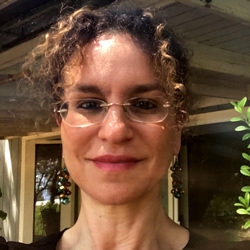
Search Results: shame
-
Reveal, own and share the inner chatter that plays over and over in your head, in between the words you speak aloud. Arnina Kashtan will help you discover, embrace and open up the places inside that you’ve hidden and judged.
-
This gentle, healing telecourse recording will assist you in unearthing feelings and issues that have become tangled up with loss, enabling you to face whatever is blocking your grief.
-
Trainer Tip: Today, when you tell yourself that you "have to" or "should" do something, notice what you feel and experience - is it a sense of duty, obligation, guilt, shame, overwhelm, constriction, heaviness? Then consider the underlying needs you are trying to meet with the activity. This can shift the purpose and intention with an energy that motivates our actions can bring empowerment and joy to our lives.
-
Whenever we make mistakes, we're often beating ourself up in a way that breeds guilt, fear and/or shame. Nonviolent Communication offers a model based in self-empathy that lets you reflect, process and move forward without the guilt, fear and shame.
-
So often we're habituated to associate a “why” question with being reproached, blamed or shamed – and so defensiveness arises. However, in order to maintain a flow of understanding and collaboration, we need to hear and say the “why” while finding other ways to ask for it. Here we look at how to ask questions that bring each of us vital information that can open up discovery and learning, for our mutual benefit.
-
Why is it so difficult to change our patterns even when we want to, even when we experience shame or despair about them? Arnina Kashtan offers some of the common pitfalls and concrete steps to overcome them in the future.
-
Blame is the game that protects me from the understanding that the cause of all my emotional distress, fear, shame and guilt comes from the part of me I call "the inner voice." As long as I keep the big bony finger of blame pointed in your direction, I can remain unaware of the fact that it is what I am telling myself about your behavior that is stimulating my painful reactions.
-
The Compass – Arnina Kashtan's in-depth transformational process – is specifically designed to support you in reliably deepening your understanding of your own and others' conditioning, and finding ways to reclaim your full connection with yourself.
-
The Compass – Arnina Kashtan's in-depth transformational process – is specifically designed to support you in reliably deepening your understanding of your own and others' conditioning, and finding ways to reclaim your full connection with yourself.
-
Trainer tip: In every interaction, we have a choice of responding in one of these four ways: judge/blame self, Judge/blame others, empathize with self, and/or empathize with others. The goal is to make a conscious choice about our response. Notice the choices you have when you receive someone’s communication today.
-
We can see throughout many examples in history that when we look for "who" is at fault, and thereby seek social change through shaming that person (or that group), it tends to lead to disastrous long term consequences. Even if it works in the short term. Instead, if we want to end cycles of violence we can seek to understand systemic causes and context of individuals' behaviour. And from there, look for solutions that stem from this understanding.
-
Sylvia Haskvitz offers a practical and effective approach to making requests. Learn the two questions that can clarify your motivation for making a request, three ways to discern a request from a demand, and five possible reasons for meeting requests.
-
A theory of judgment is that it is how we make sense of life and quickly assess what is safe or not safe. However, this has somehow been translated into right/wrong thinking. In this video, Aya explores different kinds of judgments and examples of each.
-
Enjoy listening in as Arnina assists participants in fine tuning what they wish for their futures, and what practices they intend to embrace as the course winds down. She also offers strategies for what they can do if they forget their intended practice, and revisits the importance of untangling Needs from Core Belief.
-
Sylvia Haskvitz uses 20+ years of experience to introduce the core concepts of Nonviolent Communication, leaving you grounded in the basics and ready to make transformative improvements to the quality of your communication.
-
From the depths of internal winter to the melting open in the warm sunshine of spring to rest in the ocean of Spirit, this poetry is a journey of discovering deep Presence through the human experiences so many of us share.
-
Trainer Tip: Taking time to mourn our regrets and unmet needs can lead to a deeper self-connection and feelings of peace.
-
What's the real reason you choose to talk about something or not? "Privacy" can become a misplaced label that's used to hide harmful behaviour. Secrets typically come from reactivity -- and can carry shame, fear or threat of harm, and take a toll. And yet, if something private gets mislabeled as a "secret" it can also trigger shame and fear. The key to all this may be in relating to privacy from a place of clear differentiation, boundaries, agency, care and discernment.
-
Trainer Tip: What is motivating your (in)actions? Are you doing something in the name of supporting deeper heartfelt needs, free of judgement or blame? Or are you bringing in consequences based on viewing the other person as having "bad behaviour"?
-
Ask the Trainer: "I'm part of a small, self-led NVC group that's been working together for almost two years. We are experiencing some growing pains in that we're still not certain how and under what circumstances to make requests, especially negative ones."





















